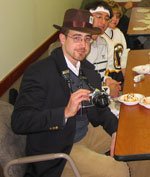Also see the list of articles, none to be taken seriously.

London boasts about its extensive CCTV camera network on streets and buses.
Across London, these posters can be seen telling us all that we are ‘Secure beneath The Watchful Eyes’ of the Metropolitan Police. I cannot tell you how much better that makes me feel. The imagery is pure 1930’s/1940’s and conjurors up the ‘Golden Age of Totalitarianism’. [more...]
This picture (from the article linked above) would fit right into the movie Brazil, alongside the “Happiness: We’re All In It Together” and “Don’t Suspect a Friend. Report Him.” posters.
Googlism is a great idea. Dave Winer wonders how it does that. Search Google itself for "Dave Winer is" (with the quotes) and you get the same hits, with just some processing of the returned excerpts to do. And, just for the record, Andrew Shearer is aware that you use Googlism.
Wait a few days for Googlebot to hit my site again, and that will start to make sense. (Could it be the start of Googlismbombing?)

At my day job, I somehow would up on an organizing committee for the department Halloween party, providing its only male representation. (I would have said ?much-needed? or ?much-appreciated? representation, but I don?t really know about that.)
Whatever the case, we decided to have our first annual costume contest, for which I was put into duty as the photographer. To set a good example we all wore costumes. So I had to come up with a costume idea for the first time since childhood.
At the party, I was supposed to be Jimmy Olsen (staff photographer for the Daily Planet, home to Lois Lane/Clark Kent/Superman), as I kept having to explain over and over. Guess no one saw the movie recently. (It would have been much more convincing with a bow tie, but I couldn?t find the one I used for junior high orchestra concerts and couldn?t bring myself to buy another.)
I'll post my notes from the Nov. 1 Intranet Usability seminar in Boston, by Jakob Nielsen and Kara Pernice Coyne, in a few days.

The weekend before last, I went biking on the trails at Lincoln Woods with a coworker and his girlfriend. The last time I went with them, a couple of weeks before, I managed somehow to snap my bike’s rear axle in two within an hour. No problems this time. (New rear wheel, though.)
The picture was taken on his tiny Sony DSC-U10 digital camera. It’s only one megapixel, and the quality of those pixels is only fair, but the small size makes up for that, allowing lots of pictures that wouldn't be practical with a bigger camera. He even tried shooting a movie while riding (on the road at the time, admittedly).
This page is now generated by the template system directly. It now comes with a new feature: an RSS plug-in. More on this later.
This replaces pyblosxom, which I had used temporarily, piping the output to static files to avoid CGI overhead.
Below is the bolus of postings built up over the few days that I worked on it.
I went to Jeffrey Siegel’s classical piano concert at RIC last Wednesday, October 23 — the first time I’ve been to a classical concert in a few years. It was part of a series he calls Keyboard Conversations™ (yes, the program always used a trademark symbol; the merchandising may follow) where he talks about each piece before playing it in full, going briefly into interesting bits of context and history, and demonstrating important musical phrases to prime everyone’s ears.
At the beginning, with Fur Elise, which everyone has heard as a recital staple, and Rage over a Lost Penny, which he called Beethoven’s party piece, I thought he might be choosing the songs based more on what he had good stories about than what were Beethoven's best works. But that fear dissolved with the next two pieces.
(Even in classical music concerts, some people still talk as if it were a movie. In his speech before the Moonlight Sonata, which he said was known for breaking the rules, Siegel added that “Beethoven’s audience would have expected a first movement that was happy and lively. First movements are traditionally happy and lively. Without further ado, the beginning of the first movement.” Then during the pause as he prepared to play, a woman behind me notified her husband, loudly and slowly, that “It’s not going to be happy and lively!”)
His aim was to be completely understandable to music novices while still imparting knowledge to musicians, and he was very successful at it. I realized that this ability had parallels with good interface design for computers. He was very careful to avoid musical jargon completely, while remaining interesting to those who knew which words he was avoiding.
An interface design should be understandable to new users without getting in the way of the experts or old hands who already know what’s going on. Same techniques.
My full review of Stephen Wolfram’s lecture at Brown on Tuesday, Oct. 22, 2002:
Couldn’t get in. Apparently math is popular.
The following will make almost no sense unless you've read about Mitch Kapor's venture, and then Don Park's reaction. Even then, you'll have to take your chances.
Destroying Value
To Don: I think I see where you're coming from. You don't want to see software given away like so many AOL CDs, because then people will associate it with worthlessness. (AOL is constantly trying to combat this by making their CDs appear more valuable, disguising them in DVD cases and biscuit tins.) You go on to say OSAF's path toward bundling free software "leads to the destruction of value".
Too late! The programs are already free. Every new computer and online service comes with mail software. (Outlook Express, Apple's Mail.app, and the free web-based services are among the many.) On the PIM side, Palm Desktop is free for download. These are what end users see, and you can't dismiss them as "poor-quality open source". Since you're talking about perception, note that even the expensive email programs look free; for most corporate users, the full Outlook client is preloaded before the computers hit their desks. (To go further, you could even say that for the corporate IT managers who actually buy Outlook, it comes as a kind of freebie with Microsoft's Select agreement, as part of the deal to get a better price on Office.)
So you can't complain that all of a sudden, OSAF will make good software passé through wide distribution. There's widespread free software already, before open source even enters the picture.
If your argument is that OSAF's program is going to be better than the ones already out there, that just sounds good to me. More competition. The others will be pressured to get better themselves.
Wishful Thinking
The three spells you would cast with your magic wand are well-chosen. They would probably do a good job of starting a pure market-driven economy in PIM software. People would research and buy the best program, leading to competition and innovation. Generally, this would help everyone by leading to better products and lower prices.
You oppose OSAF because it doesn't fit into this world, and thus prevents you from effectively using the wand (unless you also used it for a fourth, anti-OSAF, spell).
But you don't even have the magic wand. None of us do. The Justice Department had something close but passed up the opportunity to use it.
You're trying to protect a fantasy. It's been widely commented that no commercial company is going to try to launch and sell a full-fledged competitor to Outlook or Office. So there is no competitive market or "ecosystem" to destroy. The word ecosystem itself is meant to mislead; it implies something delicate. A true competitive market is all about companies undercutting and outdoing each other, shaking things up instead of protecting the status quo.
Making this kind of software free and bundling it ensconces it as a basic service. It increases the standard of living for everyone. Then the software market can move on to newer and better things. Would you be happy if, 50 years from now, the software market had not advanced, and companies were selling recognizable email clients and PIMs as system add-ons for $40? I'd prefer it if we found a way to treat the status quo as a baseline and focus our efforts on moving up from there.
Even given the continuing existence of free software, even given Mitch Kapor's $5 million jump-start (which would be nothing to a large software company), if a new company can make a much better product, then they can sell it. This is actually a good argument for a BSD-style license (which rumor has it OSAF will use). The new company could build just the new part, and their costs wouldn't include re-implementing everything that had come before.
Since every company only has a finite amount of resources that can be put into making a new product, a leg up to begin with could also improve software in general, both free and commercial. And allowing new competitors to enter the market more easily would actually help start a real market after all. That, of course, is a bit of open-source plus software-market utopia, but it's more realistic than magic-wand plus software-market utopia.

The Providence Machine Company building, on Eddy St. in Providence. (The small words on the sign say "Inquire Within".)
« Previous Page -- Next Page »